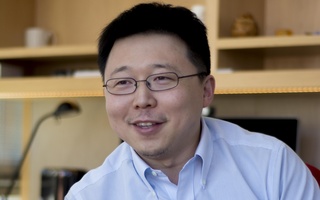New technology being researched by professors at Harvard Medical School has made methods of gene surgery more efficient and accessible and can potentially help to address major diseases caused by genetic disorders such as sickle cell anemia.
In January 2013, George M. Church, professor of genetics at the Medical School, and Feng Zhang, an Massachusetts Institute of Technology Researcher, independently showed that a clustered regularly interspaced short palindromic repeats, or CRISPR, paired with an enzyme named Cas9 can be used to edit gene sequences in animals and humans. Last month, according to a press release from the Medical School, researchers found that adjusting the length of RNA strands in the synthetic enzymes could decrease the possibility of off-target DNA mutations.
Although several older technologies for gene surgery have been developed in the past, the CRISPR/Cas9 system allows scientists to more precisely edit portions of genomic codes of organisms.
“It opens up the possibility of editing a variety of genomes and doing it on a scale that has never been done before,” said Church.
Gene surgery works by editing sequences of DNA base pairs which encode an organism and its behavior. CRISPR, which gets its name from sequences of bacterial DNA that aid in recognizing foreign viral DNA sequences, mimics the natural technology. Previous methods of gene editing were less precise, but CRISPR uses RNA and Cas9, a protein guided by an RNA molecule that removes specific gene sequences, to perform the deletion or edit.
According to Church, CRISPR technology is on the scale of 100 times easier, ten times more efficient, and increasingly more applicable to organisms than prior methods.
Church spoke additionally about the broad benefits that gene surgery could have on organisms.
Mutations in the human genome can have significant deleterious effects, including Huntington's disease and Cystic Fibrosis. With CRISPR, experts might be able to correct these disorders. While Church notes environmental factors play a role in many ailments, he said that genetic editing can potentially override these effects.
“If you get very fine, accurate, and inexpensive control over your genome, you can fundamentally change the kind of organism you are,” Church said. “You are extending human capacity.”
Although Church acknowledges there are many ethical considerations involved associated with gene surgery, he said he does not feel that CRISPR technology would create a larger division between the rich and the poor.
Church said that the rapid “democratization of technology” and plummeting costs are making more innovations accessible to more people.
Last November, Church helped co-found Editas Medicine, a genome editing company that he said that he hopes will help push the technology into clinical trials within the next year or two.
—Staff writer Noah J. Delwiche can be reached at noah.delwiche@thecrimson.com. Follow him on Twitter @ndelwiche.
Read more in University News
EdX Partners with Facebook to Provide Open Online Education to RwandaRecommended Articles
-
Soderbergh's Sweet RevengeIf you're going to pay about 15 bucks to go out to the movies, you're probably not looking for any
-
A Tepid ThrillerT HE NIGHT CALLER is billed as the best psychological thriller since psycho. It is certainly not that, but there
-
‘Too Darn Hot’ Warms Up Lowell Lecture HallDespite the dreary conditions outside, temperatures were rising on Friday evening in Lowell Lecture Hall during “Too Darn Hot,” a
-
Geneticist Embroiled in Conflict of Interest ControversyThe founding director of the Broad Institute has come under fire for publishing an article that critics charge fails to disclose a conflict of interest and understates the contributions of women in developing a biotechnology.
-
 Late Nights, Chinese Takeout, and DNA Scissors: The Discovery of CRISPR
Late Nights, Chinese Takeout, and DNA Scissors: The Discovery of CRISPR













